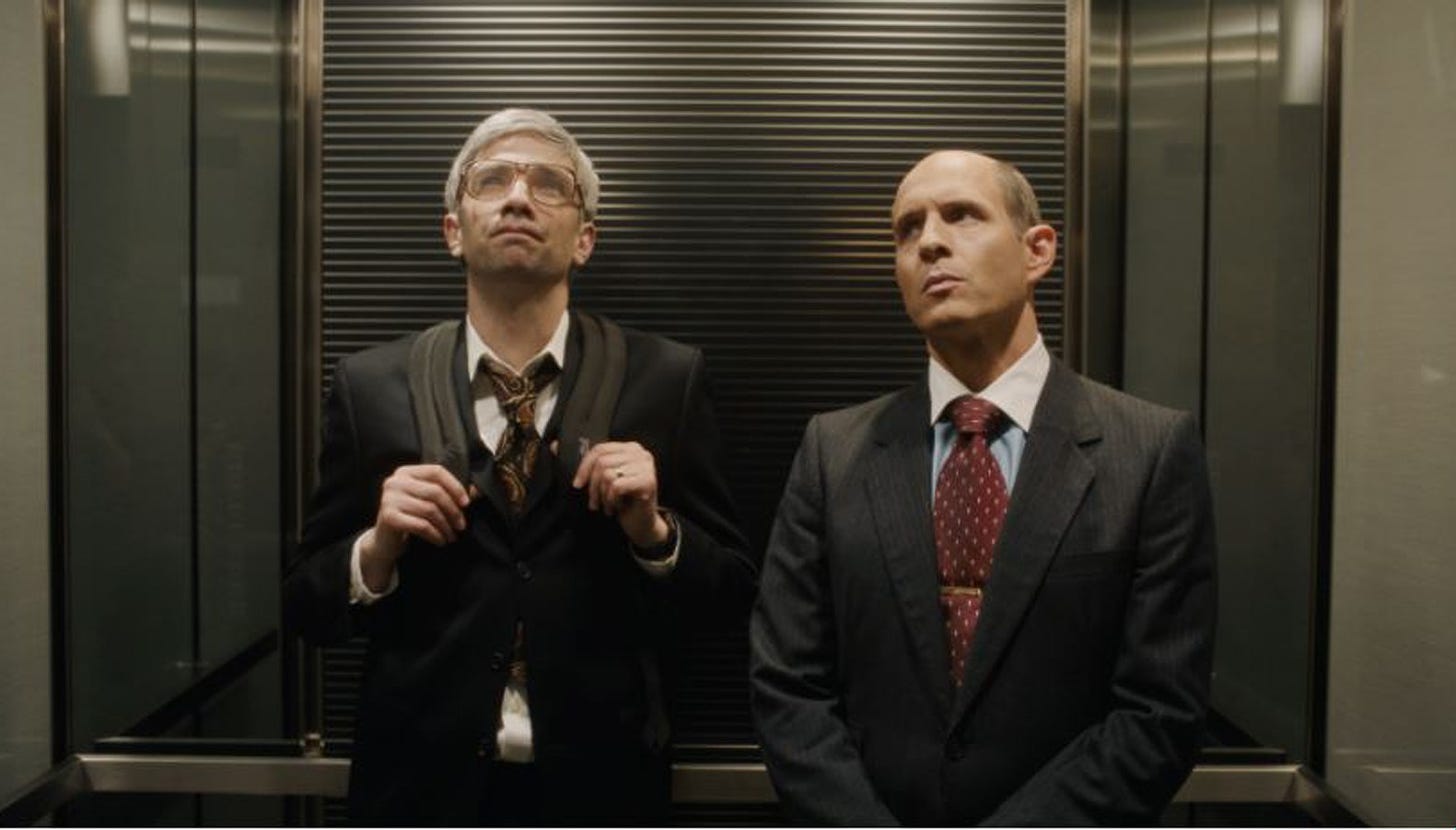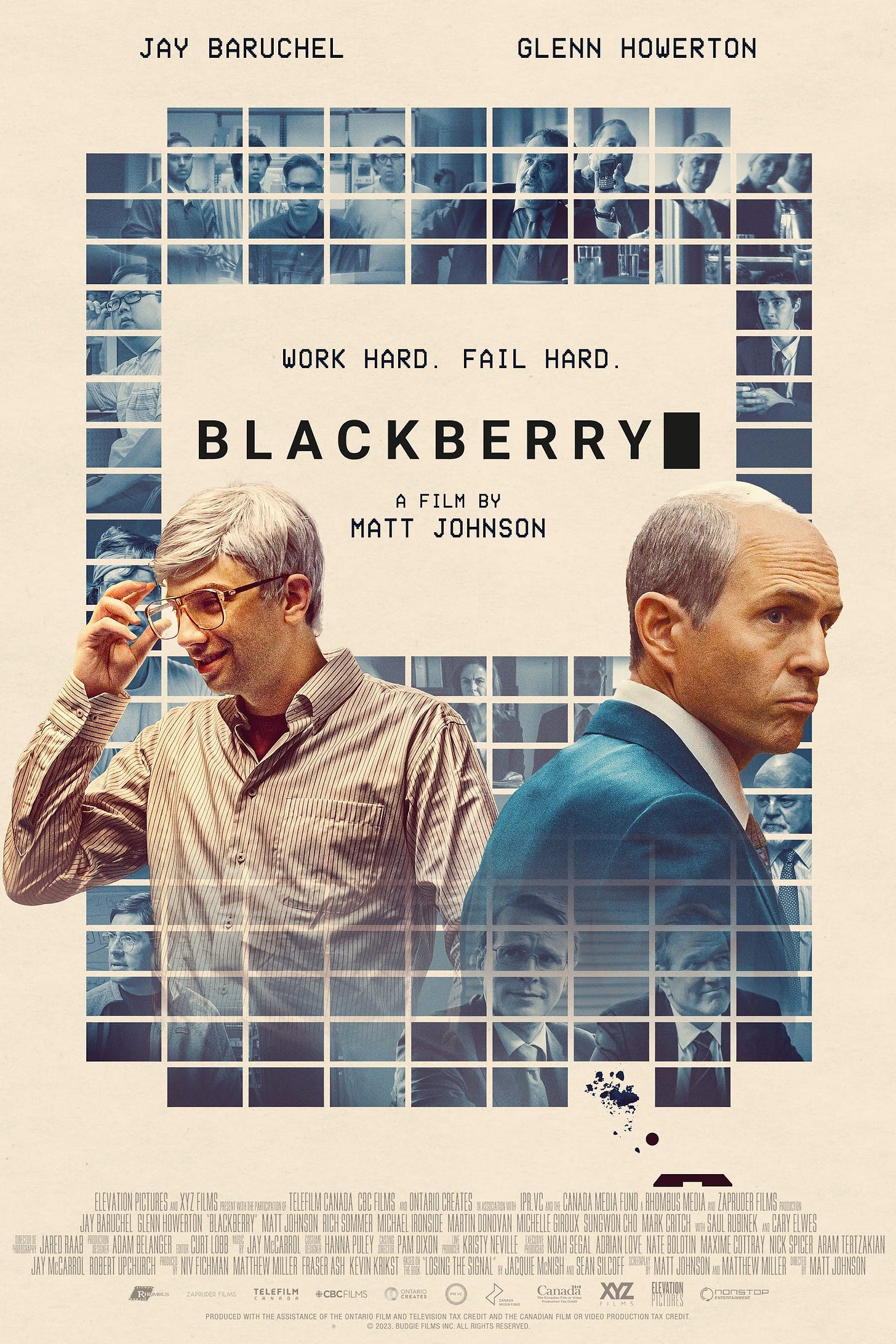I saw Blackberry last night.
Business movies are getting more popular.
I get that. What’s there not to love?
The speed, the competition, the charisma of Übermensch founders, an exhilarating rise and fall story.
That’s why they produce them. They make for a good story.

These movies are not all the same, of course. For instance, Blackberry has a unique tone. It’s almost an offbeat tragicomedy—very different from, say, The Social Network or the WeCrashed series.
Still, the moral of the story in this film is pretty trite:
“Oh, if only they knew what was coming (the iPhone in this case) they would not have been so helpless”.
A business tale, a business lie
How many times have you been to a conference where a suit-and-tie keynote speaker told you one of these stories?
Blockbuster vs Netflix
Yahoo vs Google
Britannica vs Wikipedia
Hotels vs Airbnb
Kodak vs Sony (Guilty! But I made a different point 😉)
And of course, Blackberry vs Apple
I bet it’s more than one.
The examples change, but the moral of the story is exactly the one of the Blackberry movie.
They (Blockbuster, Yahoo, Britannica, Hotels, Kodak, Blackberry) did not know that their market was about to change forever because they were blind to the innovation that The Rebels (Netflix, Google, Wikipedia, Airbnb, Sony, Apple) were secretly creating.
Unfortunately, that’s often inaccurate.
Knowledge is a fake problem
If you have worked with or for any big corporation, you know this.
Knowledge is not the problem. Actually, corporations tend to be knowledge powerhouses.
They can afford yearly market studies. They can pay the best consulting firms to do trend scouting. They can speak with the most brilliant tech investors.
C-levels and directors at successful companies are inundated with decks, reports, and analyses. These are incredibly smart and talented individuals too, capable of transforming all this pricey information into real knowledge.
So, what’s stopping these companies from anticipating or at least reacting quickly to changes in their market? Given that they have all the resources and knowledge they need.
Jim, ex-co-CEO of Research in Motion (who owned the Blackberry brand) gives us a hint of the real issue in this (↓) section of the interview he released after the film came out.
I spent a couple years trying to build a service business. I tried to persuade the board and Mike (co-CEO) to get out of hardware because it didn’t favour us anymore. We had a very profitable and growing service business and I wanted to open that to other devices. But Mike said that it would kill the hardware, and I said: hardware is already dead.
- Jim Balsillie
The will to change
Jim's story offers an important lesson in the world of business: it's not merely about gaining access to information or having a correct vision.
The true challenge lies in cultivating the will to change.
Blackberry, a complex and rapidly growing organisation, found itself entangled in its own expansion, becoming too slow in adapting to the ever-evolving market.
While the iPhone was taking market share, Blackberry was solving fulfilment issues and figuring out how to scale its production.
It was like trying to stop a massive ship in full motion.
It’s not enough to know that the tides are pushing in a certain direction, the ship is taking on water, or the passengers are unhappy.
What matters is that the crew acknowledges the need for change, assumes very difficult responsibilities, and acts upon it, adjusting the course of travel.
The job of a CEO,
and really of any C-suite is that of creating and nurturing the will to change, even when everything appears to be running smoothly.
Even when the most immediate concerns are related to fulfilment rather than demand, exploitation rather than exploration, the CEO's primary responsibility is always to keep the eyes locked on the changing tides of demand.
And convince the team to steer when the tides are changing.
Basically, a good CEO is both an optimist and a paranoid 😁
Survive and thrive, in business, is never about knowledge or resources; those are merely prerequisites.
It's about an uncomfortable commitment to continuous change.
-gs
Oh, wow! You made it to the end. Click here to 👉 SHARE this issue with a friend if you found it valuable.






Totally agree with your analysis Giuseppe.
The fear of mistaking and changing (when seating up there) is definitely one of the issues.
Another thing that - in my opinion - can make a company successful over another, is the capability of being human in their communication: in other words simple, emotional (not that makes people cry but that make people’s emotion activate) and relatable.
I’ll give you an example from the prehistory, the AirPod. As you might know, many versions of an MP3 were existing previous AirPod. However, everything about these products was communicated focusing ON the product. Starting from the name MP3.
Then Apple launched AirPod. They sold the value for the people beyond its tech. I remember the campaign was all about freedom for people to have all their loved music in just a pocket.
Again, simple and relatable. Nothing about complicated tech but just about: “do you wanna have all the music you like in your pocket?”
To remain on your topic, I remember that Blackberry was still loved by many people even after the launch of the iPhone. iPhones had advanced technology, but there were still people that loved having a physical keyboard or the possibility of removing batteries or what’s so ever. For sure blackberry was destined to loose tons of market shares. But it could have still become a niche product.
However, in BB nobody every communicated to those people who loved the BB features in a simple, human way.
Working in communication I see still A LOT of communication that is still clunky, complex and that misses to be simple, easy to understand and far from people pov.
Hope this makes sense to you and apologies for LOOOOOONG message.
Thanks for your - as always - inspiring stories.
Luca
I completely agree with you, Giuseppe. It is incredibly important to realize that business models need to be reshaped based on continuous improvements and the changes demanded by the market. A visionary CEO doesn't possess a special power to predict the unpredictable but has the ability to catch and follow new trends, constantly readjusting their direction. On a related note, I'd like to share a recent insightful talk on the future of Leadership
🎬https://youtu.be/TU3agRtkbOw?si=HeXmb3ZXUeWYftWA